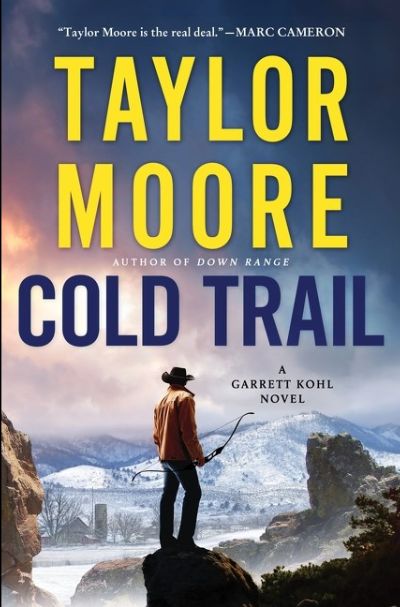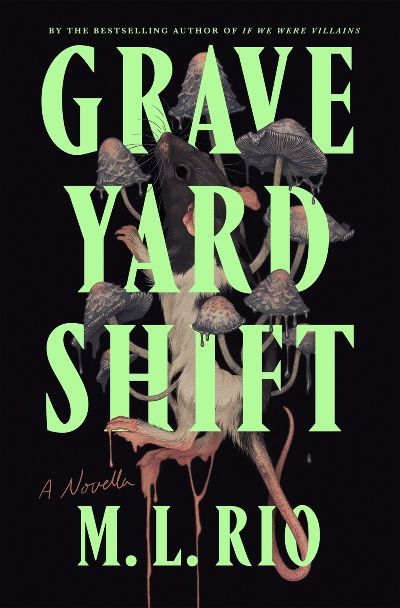A wonderfully rich narrative that ricochets between the past and the present, reminding us just how complex life can be. Madeline Brimley left rural Georgia years ago, eventually settling in Atlanta to pursue a career in the theater, a career that’s now floundering. Then she learns that her beloved Aunt Rose—who has been a role model for Madeline throughout her life—has died, leaving her an eccentric bookstore housed in a grand old Victorian mansion in Enigma, GA. But there’s a catch. According to Rose’s will, Madeline needs to live in Enigma for a year before the store belongs to her. Is this the life Madeline wants? Add to this several acts of violence directed against her—menacing phone calls, a threatening fire, and a startling murder—and Madeline, and the reader, are questioning the many secrets that are all too alive in this tiny town. Fortunately, Madeline is befriended by several women—the Episcopalian reverend in particular—who bring plenty of joy and laughter to the story. And while this novel would seem to use many of the classic cozy tropes, it is wonderfully unique in its own right. Looking forward to more of Madeline.
Review
Before heading to her evening shift as an investigator for Phoenix Seven, an Italian liaison unit that works with the U.S. military in Naples, Nikki Serafino is relaxing on the sailboat she co-owns with her friend, undercover cop Valerio Alfieri, when they rescue a woman who has been abandoned in the bay by her abusive boyfriend. As they head back to port, the Calypso’s keel strikes a decomposing body; Nikki notes the ligature marks on the man’s neck. The next day, while assisting a U.S. serviceman and his family in the wake of a traffic accident, she discovers another murder victim, this time one who’s been shot to death. After the bodies are identified as American naval officers, Nikki must conduct a tricky balancing act of partnering with both NCIS Special Agent Durant Cole and the Italian police in the investigation of possible links between the killings. Could the Camorra Mafia be involved? At the same time, Nikki’s intense family drama, involving the recent loss of her American mother, a loser brother in deep debt to local gangsters, and a tumultuous relationship with her controlling boyfriend, Enzo, threaten to derail her probe. Heider, who lived in Naples for several years and deployed as a civilian analyst aboard U.S. and European naval ships, makes an impressive debut with this engrossing thriller that captures both the baroque beauty and gritty danger of Italy’s third-largest city. It also introduces a tattooed, kick-ass female protagonist (“Nikki was short and compact and muscular with a dynamic, interesting face”) who may remind some readers of Stieg Larsson’s Lisbeth Salander but without that character’s severe asocial tendencies. If there is a minor flaw, it’s that the Heider’s vividly drawn Italian characters far outshine her dull American counterparts. An enjoyable summer read.
Small-town struggles meet CIA relentlessness in prolific author Abramson’s latest thriller. It stars two likable protagonists, FBI Special Agent Amberlyn Reiner and Marine Captain Luke Steele. As the book opens, former school psychologist Amberlyn is planning to see her best friend, but plans are derailed when her skills are needed in the investigation of an Oklahoma City bombing-like event. Also entangled is Luke, who’s normally tasked with carrying the nuclear “football” in his role as a military aide to the President, but who is asked to help after he recognizes a connection to his hometown in photos of the event. Amberlyn has been bereaved by the bombing and Luke is loath to return to the town where he was relentlessly bullied, not to mention the high school reunion that will offer valuable investigative opportunities but one for the now-grown bullies to continue their abuse. So neither wants to be there, a feeling that’s more than vindicated by the danger visited on them in the town by the bullies…and perhaps by others. But they also find in the town kindnesses and even a fledgling romance, which entwine well with the criminal side of the story to create a gripping and satisfying series debut.
It’s not every protagonist who introduces herself to readers while in the middle of getting an intimate area waxed, but Rose Aslani isn’t every protagonist. She’s the quintessential new New York Gen Zer: being worked to death in media, living with a strange roommate who seems only vaguely familiar with being clothed, and fielding suggestions from her parents like, “Why don’t you email the New York Times and ask them for a job?” All the while, Rose is nursing an obsession with the titular Most Famous Girl in the World, Poppy Hastings. A couple of years ago, Poppy’s fake-socialite scam was exposed–by Rose–and she’s just gotten out of prison for those exploits, but it’s too little for her nemesis. Rose knows that Poppy’s scamming was the tip of a criminal iceberg, and she stalks the woman, who flaunts her zany, fibbing ways to every internet hack who’ll listen. The public can’t get enough of it, while Rose is accused at work of paranoia, dropped by a succession of therapists, and falling deeper into reliance on booze and pills. Then the journalist begins to receive texts that help her in her quest to take Poppy down, a quest on which she’s aided by dishy FBI agent Simon. The story takes on some serious themes, notably Rose’s lifelong feeling of alienation as the daughter of immigrants from Iran who love her (as will readers) but “[love] the idea of passing more.” Closing with several shocking twists, this is one for women who’ve had it and fans of the true-crime wave of podcasts and documentaries about scammers.
Garrett Kohl wants nothing more than to spend time with his adopted son, Asadi, and his girlfriend, Lacey. On leave from his job with the DEA, he collaborates with an old nemesis to get out of debt. Sabotage at a nearby natural gas plant threatens alliances, Garrett’s land, and his family when environmental protestors determine a pipeline runs through the property, and they will destroy it regardless of the cost. That is only part of the fun that Moore crafts in his latest thriller. The author spends quality time with some of his secondary characters, including Kim, Garrett’s former boss with the CIA, who is trapped while on a rescue mission in Afghanistan, and Asadi, who ends up lost with two others, one of whom is untrustworthy. These side characters shine in the spotlight and come to life even more than in Moore’s previous novels. The Texas landscape also plays a central character, as everything comes to a boil in the middle of an impending blizzard. Fans of C.J. Box and Brad Taylor should check this out, and first-time readers of the series will not miss a step.
Hang on to your hats, this is quite the ride. Three writers—Kat De Noir (writer of erotica), Cassie Pringle (a Southern mom and writer of multiple cozies), and Emma Endicott (uptight New England author of historical fiction)—meet up at Bouchercon, the leading crime writers’ conference. The three women have lots in common: same editor and same obsession with the leading literary hot shot, Brett Saffron Presley (BSP). BSP is currently living on a remote island off the Hebrides, basically as a recluse, and the three women head off to the island to work on their joint novel. Or is that really their intent? Turns out that they each know BSP, and loathe him equally—for pretty much the same reasons—and BSP-stalking takes precedence over any writing. Castle Kinloch, an over-the-top Gothic castle full of hidden passages, provides the background, while the sordid history of a 19th-century laird lends a contemporary creepiness. Enjoy plenty of humor among the women and the native Scots, lots of insider jokes about the publishing industry, and a great big helping of Scottish Romance. Williams, Willig, and White have delivered one fabulous ride that’s sure to leave readers hungry for more.
Michael Falco’s novels are a bit like War and Peace, if Tolstoy wrote cozies set on the Amalfi coast. They are big and sprawling, as rich with characters—most family, many returnees—as they are rich in plot. But at the center of the book stands Bria Bartolucci, the young widow and mother who moved to Positano to open a B&B, now a great success. But bad things still happen, and when a famous chef is murdered—poisoned!—while filming a cooking show, it’s Bria who is right next to him. From there we are off and running as Bria attempts to solve who murdered the chef—an endeavor that is wrapped up in a series of smaller mysteries, likely suspects, and red herrings—without getting killed herself. Come for the mystery, but stay for the wonderful humor and the familial love. Some diversity—doesn’t every family have at least one queer cousin?—would go far in making the series more credible.
A mission to explore an uninhabited planet in another solar system excites Jose Carriles as he gets to pilot the vessel Mosaic, which takes the explorers to Esparar. Corin Timony, a former spy on the lunar colony New Destiny, receives a coded message from Jose saying the ship is in distress and needs immediate aid. Seconds after she receives the message, another one appears, saying to disregard the previous one and everything is okay. When Corin questions what happened, she finds herself in danger and surrounded by people wanting her to stay quiet. Jose learns the message was ignored, and as he works to figure out what is really happening onboard the Mosaic, he puts himself and the crew’s lives at risk. The story bounces back and forth between Jose and Corin, and the novel excels at slowly building the paranoia, forcing the reader to turn the pages faster to figure out what is going on. And the payoff is glorious. As a fan of both Rob Hart and Alex Segura, I was glad to find that their writing styles blend well together, and this mix of Star Trek themes and a story like Robert Ludlum and Andy Weir had a love child is a blast. Seek out this Dark Space.
Fourteen-year-old Ava Bonney has a curiosity about dead things. She keeps a secret roadkill body farm in an abandoned garden near the local motorway and likes to sneak out of her flat in the dead of night to note the decomposition rates of her finds. But on this particular evening in May 1981, she discovers the putrefying body of her classmate Mickey Grant, who disappeared from a local disco two weeks ago. “Ava knew him as an unpleasant boy, a bully you couldn’t walk past without him saying something spiteful. When he went missing, Ava hadn’t cared.” But she telephones the police and, not wanting to reveal her unusual hobby, disguises her voice as Mrs. Poshy-Snob, a woman with a low voice and flawless diction. When he interviews Ava during his inquiries, Detective Sergeant Seth Delahaye is impressed by the teen’s intelligence and self-possession. Signs point to a monstrous serial killer at work after Ava and her best friend John find another mutilated corpse, that of a six-year-old boy. In alternating chapters, Tierney’s compelling narrative follows Ava’s and Delahaye’s separate investigations until the two threads braid into a chilling climax. Ava’s precocity may remind readers of Alan Bradley’s 11-year-old amateur sleuth, Flavia de Luce, but Ava uses her morbid studies to escape an unhappy home life, and her territory is not a cozy English village but the gritty, impoverished suburb of Rudery, South Birmingham. Selected as a finalist in the Daily Mail First Novel competition, this astonishing, beautifully written debut is creepy, gruesome, and heartbreaking. One of the best thrillers of the year.
Some books end with a recipe for a cake or cookie that was mentioned in the story along with nice characters in pleasant surroundings. Then there’s Graveyard Shift. No nice characters, definitely no twee surroundings, and the back matter has two lists: one of songs including “Nightmare” by the Rats and “Bury Me with It” by Modest Mouse (you’ll note the vermin theme) and recipes for cocktails including Corpse Reviver #1. The novella drops readers right into the horror, which brings together the kind of eclectic bunch gathered by a smoking habit. These insomniacs and late-shift workers meet nightly for a smoke in the graveyard of a college town’s dilapidated church, where they witness the dumping of something very unexpected and even more horrible than they would have imagined. Edie, the relentless journalist in the group, seeks answers, aided by bartender Theo, who’s witnessed one of the other weird goings on in the town. Called “Hostile Incidents,” these are instigated by so-called Belligerents, the several “weary, mild-mannered” people who have gone “suddenly berserk.” Readers will want to get their shaky hands on Rio’s previous work, If We Were Villains, after this deliciously bizarre, creepy tale.










